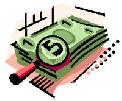
 |
|
| Financial Terms | |
| Non-insured plans |
|
Information about financial, finance, business, accounting, payroll, inventory, investment, money, inventory control, stock trading, financial advisor, tax advisor, credit.
Main Page: payroll, business, money, inventory control, inventory, financial advisor, stock trading, tax advisor, Also see related: buy home, home insurance, real estate, homebuyer, homes, home buyer, first time homebuyer, credit, homebuying, |
Definition of Non-insured plans
Non-insured plansDefined benefit pension plans that are not guaranteed by life insurance products. Related:
Related Terms:All or noneRequirement that none of an order be executed unless all of it can be executed at the specified price. All-or-none underwritingAn arrangement whereby a security issue is canceled if the underwriter is unable Insured bondA municipal bond backed both by the credit of the municipal issuer and by commercial Insured plansDefined benefit pension plans that are guaranteed by life insurance products. Related: noninsured plans Monetary / non-monetary methodUnder this translation method, monetary items (e.g. cash, accounts Non-cumulative preferred stockPreferred stock whose holders must forgo dividend payments when the Non-financial servicesInclude such things as freight, insurance, passenger services, and travel.  Non-parallel shift in the yield curveA shift in the yield curve in which yields do not change by the same Non-reproducible assetsA tangible asset with unique physical properties, like a parcel of land, a mine, or a Non-tradablesRefer to goods and services produced and consumed domestically that are not close Noncash chargeA cost, such as depreciation, depletion, and amortization, that does not involve any cash outflow. Noncompetitive bidIn a Treasury auction, bidding for a specific amount of securities at the price, whatever it Nondiversifiability of human capitalThe difficulty of diversifying one's human capital (the unique Nondiversifiable riskRisk that cannot be eliminated by diversification. Nonmarketed claimsClaims that cannot be easily bought and sold in the financial markets, such as those of NonrecourseWithout recourse, as in a non-recourse lease.  NonredeemableNot permitted, under the terms of indenture, to be redeemed. NonrefundableNot permitted, under the terms of indenture, to be refundable. Nonsystematic risknonmarket or firm-specific risk factors that can be eliminated by diversification. Also Tax-deferred retirement plansEmployer-sponsored and other plans that allow contributions and earnings to Non-production overheadA general term referring to period costs, such as selling, administration and financial expenses. noncontrollable variancethe fixed overhead volume variance; non-negativity constrainta restriction in a linear programming non-value-added (NVA) activityan activity that increases the time spent on a product or service but that does not increase its worth or value to the customer Nonqualified Retirement PlanA pension plan that does not follow ERISA and Nonqualified Stock OptionA stock option not given any favorable tax treatment Nonmarketable SecurityA debt or equity security for which there is no posted price or bidand- Nonrecurring ItemsRevenues or gains and expenses or losses that are not expected to recur Nonconforming materialAny inventory item that does not match its original design Nonsignificant part numberAn identifying number assigned to a part that conveys InsuredThis is the person covered by the life insurance policy. Upon this person's death, a tax free benefit will be paid to that person's estate or a named beneficiary. Insured MortgageAn insured mortgage protects only the mortgage lender in case you do not make your mortgage payments. This coverage is provided by CMHC [Canada Mortgage and Housing Corporation] and is required if a person has a high-ratio mortgage. [A mortgage is high-ratio if the amount borrowed is more than 75% of the purchase price or appraised value, whichever is less.] Insured Retirement PlanThis is a recently coined phrase describing the concept of using Universal Life Insurance to tax shelter earnings which can be used to generate tax-free income in retirement. The concept has been described by some as "the most effective tax-neutralization strategy that exists in Canada today." Non-Smoker DiscountIn October 1996 it was announced in the international news that scientists had finally located the link between cigarette smoking and lung cancer. In the early 1980's, some Canadian Life Insurance Companies had already started recognizing that non-smokers had a better life expectancy than smokers so commenced offering premium discounts for life insurance to new applicants who have been non-smokers for at least 12 months before applying for coverage. Today, most life insurance companies offer these discounts. Non-Medical LimitThis is the maximum value of a policy that an insurance company will issue without the applicant taking a medical examination, although medical questions are invariably asked during the application process. When a non-medical issue is made through group insurance, in most cases, medical data is not requested at all. NSF (non-sufficient funds)This appears on your statement if there are insufficient funds in your account to cover a cheque that you have written or a pre-authorized payment that you have already arranged. You will be charged a service fee for non-sufficient funds. InsuredPerson whose life is protected under a specific policy. Life InsuredThe person who's life is protected by an individual policy. Non-participating PolicyA type of insurance policy or annuity in which the owner does not receive dividends. Related to : financial, finance, business, accounting, payroll, inventory, investment, money, inventory control, stock trading, financial advisor, tax advisor, credit. |